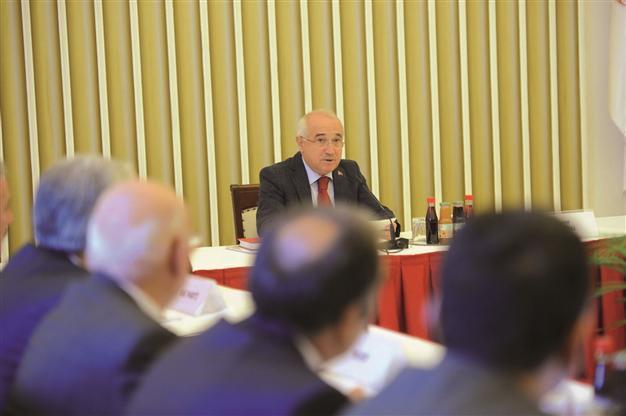Commission to gather on religious education
ANKARA - Hürriyet Daily News

Parliament’s Constitution Conciliation Commission which has been headed by Parliamentary Speaker Cemil Çiçek (C) will return to work on Aug 27 to discuss the most critical articles of the new constitution dealing with “freedom of thought and faith,” on which it failed to reach a consensus in its last session.
Parliament’s Constitution Conciliation Commission will return to work on Aug 27 after a long break. The commission will discuss one of the most critical articles of the new constitution dealing with “freedom of thought and faith,” on which it failed to reach a consensus in its last session. The parties have solidified their proposals about the article during the break.The Constitution Conciliation Commission will continue writing the “Fundamental Rights and Freedoms” section of the constitution this week, according to information obtained by the Hürriyet Daily News. The four parties came to an agreement on the introductory paragraph of the “freedom of thought and faith” article, which is among the most highly disputed articles in this section, with the provision that “Everyone has the freedom of thought and faith. This freedom includes believing in a religion, changing religious faith, and the freedom not to believe in any religion.” No other consensus was reached on the article, but constitutional assurance will be provided for atheists, which has been supported by the Republican People’s Party (CHP) and the Peace and Democracy Party (BDP) from the very beginning of the process.
Along with this, the CHP proposed that freedom of thought and faith should be protected, on condition that it does not impinge upon the protection of public order, one’s general health condition, or the rights and liberties of others. The Justice and Development Party (AKP) objected to this proposal, insisting instead on the expression: “Everyone can perform their [religious rites] and practice their faith alone or in groups, and in open or closed areas.” The CHP did not agree with the right of groups to perform religious rites in open areas, and proposed instead the expression “everyone can perform religious rituals,” to which the AKP objects.
The AKP and BDP want the state supervision of religious education to be abolished. The two parties wrote a regulation which removes state supervision of religious education, leaving it to religious communities. However, the CHP objects to the proposal and wants state supervision to continue. The Nationalist Movement Party (MHP) made another proposal, which is closer to the CHP’s stance: “Education in the areas of religion and ethics is carried out under the supervision and control of the state. While the state performs its duty in education, it also respects parents’ right to demand education in accordance with their religious and philosophical beliefs,” the MHP’s proposal read. In the present Constitution, this provision reads “Education in the area of religion and ethics is carried out under the supervision and control of the state.”
No consensus on religion classes
The AKP and MHP also proposed that religious education should be among the compulsory classes in elementary and high schools. The CHP has prepared a proposal objecting to compulsory religious education, arguing that this subject must be discussed together with the article regulating the freedom of education, and on the basis of ethics and religion lessons. The BDP also suggested that religious education should be optional. The CHP wants the following expression to be included in the “freedom of faith” article, because the party sees it as guaranteeing the secular and democratic nature of the government: “The freedom of thought and faith cannot be used with the intentions of basing the state’s social, economic, political or legal order on religion, or for personal interests or authority. No one can exploit or abuse religions, religious beliefs and religiously sacred things.”
Like the CHP, the MHP also demands assurances regarding religion and the ruling regime, and insists on a proposal such as “Freedom of religion, conscience, belief and worship cannot be used to base the constitutional order on religious rules.”
















